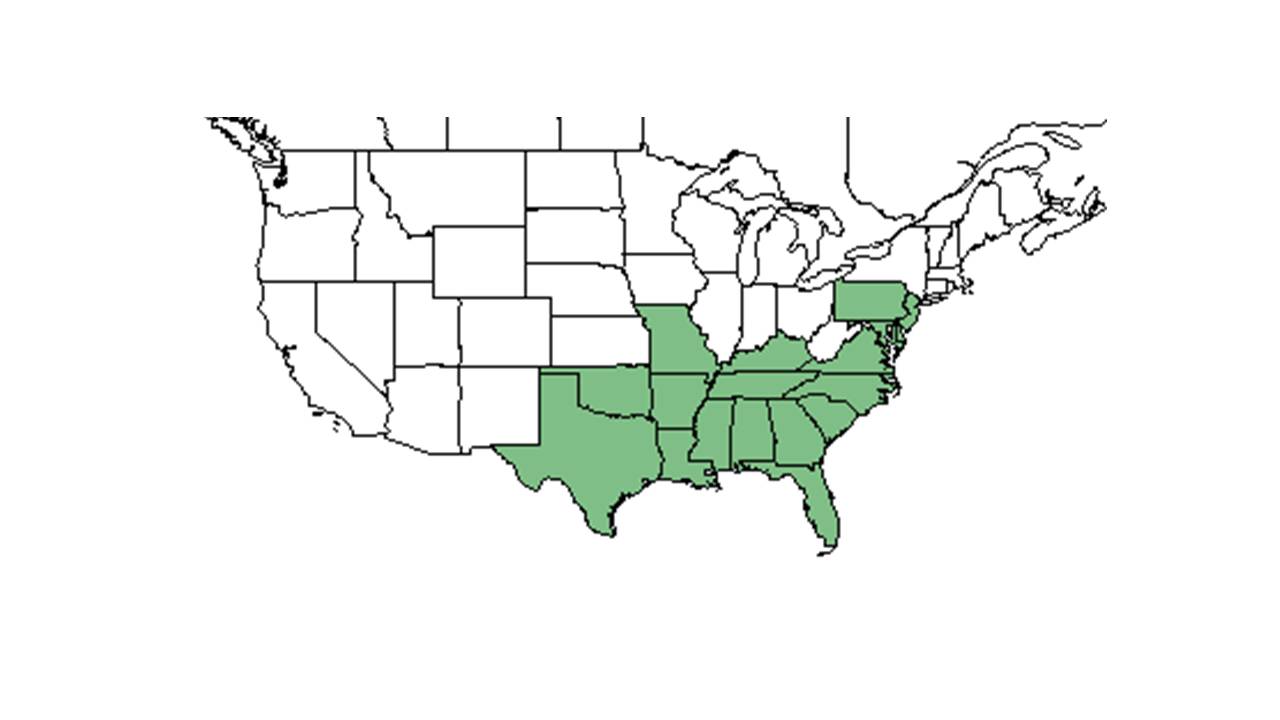Difference between revisions of "Cyperus croceus"
KatieMccoy (talk | contribs) |
|||
| Line 32: | Line 32: | ||
It can be found in mixed-pine forests,<ref name="Archer et al 2007">Archer, J. K., D. L. Miller, et al. (2007). "Changes in understory vegetation and soil characteristics following silvicultural activities in a southeastern mixed pine forest." Journal of the Torrey Botanical Society 134: 489-504.</ref> upland hardwood forests, swampy woodlands, and dry ponds (FSU Herbarium). It can also occur in disturbed habitat such as roadsides, citrus groves, spoil banks, and pastures (FSU Herbarium). | It can be found in mixed-pine forests,<ref name="Archer et al 2007">Archer, J. K., D. L. Miller, et al. (2007). "Changes in understory vegetation and soil characteristics following silvicultural activities in a southeastern mixed pine forest." Journal of the Torrey Botanical Society 134: 489-504.</ref> upland hardwood forests, swampy woodlands, and dry ponds (FSU Herbarium). It can also occur in disturbed habitat such as roadsides, citrus groves, spoil banks, and pastures (FSU Herbarium). | ||
| + | |||
| + | Associated species includes ''Alternanthera, Carex, Cephalanthus, Polygonum'' (FSU Herbarium). | ||
===Phenology=== <!--Timing off flowering, fruiting, seed dispersal, and environmental triggers. Cite PanFlora website if appropriate: http://www.gilnelson.com/PanFlora/ --> | ===Phenology=== <!--Timing off flowering, fruiting, seed dispersal, and environmental triggers. Cite PanFlora website if appropriate: http://www.gilnelson.com/PanFlora/ --> | ||
Revision as of 21:36, 21 October 2015
| Cyperus croceus | |
|---|---|
Error creating thumbnail: Unable to save thumbnail to destination
| |
| Scientific classification | |
| Kingdom: | Plantae |
| Division: | Magnoliophyta - Flowering plants |
| Class: | Liliopsida – Monocotyledons |
| Order: | Cyperales |
| Family: | Cyperaceae |
| Genus: | Cyperus |
| Species: | C. croceus |
| Binomial name | |
| Cyperus croceus Vahl | |

| |
| Natural range of Cyperus croceus from USDA NRCS Plants Database. | |
Common name: Baldwin's flatsedge
Contents
Taxonomic notes
Description
A description of Cyperus croceus is provided in The Flora of North America. This species is a perennial graminoid.
Distribution
Ecology
It is one of the first plants to appear after clear-cutting; it can appear within three years.[1]
Habitat
Cyperus croceus requires a semi-tropical climate and can dwell in temperatures from -1 to 37 degrees Celsius. It prefers moist areas, including fluvial environments and floodplains, but can occur in a range of soils, from sand, to sandy peat, loam, and drying loamy sand (FSU Herbarium).
It can be found in mixed-pine forests,[1] upland hardwood forests, swampy woodlands, and dry ponds (FSU Herbarium). It can also occur in disturbed habitat such as roadsides, citrus groves, spoil banks, and pastures (FSU Herbarium).
Associated species includes Alternanthera, Carex, Cephalanthus, Polygonum (FSU Herbarium).
Phenology
C. croceus has been observed flowering and fruiting in May through November (FSU Herbarium).
Seed dispersal
Seed bank and germination
Fire ecology
It is fire tolerant (FSU Herbarium).
Pollination
Use by animals
Diseases and parasites
Conservation and Management
Cultivation and restoration
Photo Gallery
References and notes
Florida State University Robert K. Godfrey Herbarium database. URL: http://herbarium.bio.fsu.edu. Last accessed: June 2014. Collectors: Loran C. Anderson, Richard Carter, Angus Gholson, Robert K. Godfrey, N. C. Henderson, M. Kral, R. Kral, H. Kurz, S. W. Leonard, J. B. McFarlin, Richard S. Mitchell, P. L. Redfearn, Paul O. Schallert, H. L. Blomquist, William R. Stimson, R. A. Norris, K. E. Blum, Ed Keppner, and Lisa Keppner. States and Counties: Florida: Calhoun, Columbia, Dade, Dixie, Escambia, Franklin, Hernando, Highlands, Indian River, Jackson, Jefferson, Lamar, Leon, Liberty, Martin, Okaloosa, Orange, Palm Beach, Pasco, Santa Rosa, Seminole, St. Lucie, Sumter, Wakulla, and Walton. Georgia: Clinch.